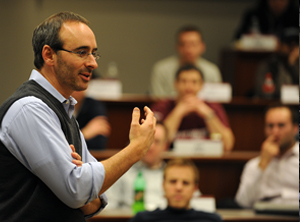Class disruption
Groupon cofounders share their secrets of online entrepreneurship with Chicago Booth students.
By Jason Kelly
Photography by Dan Dry

Online entrepreneur Eric Lefkofsky upends entrenched industries ripe for innovation.
Eric Lefkofsky doesn’t take a break. As University of Chicago Booth School of Business students scatter to stretch their legs during a three-hour course on online entrepreneurship, a line forms in front of him. The Groupon cofounder and adjunct professor sips from a can of Diet Coke as he answers students’ questions and assesses their ideas.
Few people have had more online-business success than Lefkofsky, 41. That’s why the students have him cornered. He’s amiable but direct, attuned to flaws in business plans and quick to point them out. As he tells the students who overflow a Gleacher Center lecture hall before the break, “Often people confuse an enhancement or a feature with a business.”
A cofounder of the venture fund Lightbank, which operates out of Groupon’s Chicago offices, Lefkofsky invests in what he calls “disruptive technology businesses.” With associate Brad Keywell, who co-teaches the course, Lefkofsky has reinvented old industries such as printing, trucking, and even the concept of coupon clipping, with Internet-based innovations.
Their success with companies like the shipping provider Echo Global Logistics and the advertising facilitator MediaBank grew out of frustration with business practices they experienced as clients. Difficulty understanding the most cost-effective ways to deliver their products with trucking companies or to buy advertising—industries rooted in traditional processes with opaque pricing—compelled them to devise more efficient methods.
After researching established business practices, they consolidated their information in proprietary databases to provide it directly to people looking for freight or media services. The Internet made their new models possible, offering customers easy access to the information. “A number of our businesses couldn’t have been created until now,” Keywell says. “The fundamentals that are required didn’t exist yet.”
Lefkofsky and Keywell have a deep understanding of those fundamentals, drawn more from business experience than formal education. Lefkofsky has written a book—Accelerated Disruption: Understanding the True Speed of Innovation (Easton Studio Press, 2007)—and they have lectured at Northwestern and the University of Michigan, where they met as undergrads and where each received law degrees in 1993.
Law school, Keywell says, “is one of the great mechanisms for understanding how to think critically about the world,” and essential to his success, he believes, because a focus on business would have been too narrow. Taking that path, Lefkofsky and Keywell say, also gave them a detachment helpful for entrepreneurial success.
With no personal affection for the industries they targeted, they attacked inefficiencies with dispassionate precision. “When you approach without the baggage, the emotion, the history, just as entrepreneurs looking to disrupt the industry, it can be done,” Keywell says. “We love building businesses rather than loving a particular business.”
Yet even master builders like Lefkofsky and Keywell insist online success depends on failure. It’s right there in the course title—Building Internet Start-ups: Risk, Reward, and Failure. “There are not many places in business-school curriculums discussing entrepreneurial failure,” Keywell says, “and the place it should have in the fabric of an entrepreneur’s life.”
The key idea behind Groupon, which has been called “the fastest-growing company ever,” emerged from a flop. Lefkofsky, Keywell, and Groupon CEO Andrew Mason—who dropped out of the University’s Harris School of Public Policy Studies to pursue his entrepreneurial goals—had previously started the Point with a similar concept.
Groupon offers discounts at local businesses contingent on a certain number of people signing up for them. The Point revolves around user-generated social issues—cleaning up a local park or boycotting a company. Like Groupon, it’s based on a “tipping point”: ten people agreeing to donate $100 to a park project or 250,000 vowing to avoid BP gas stations—enough to give a plan critical mass. But the Point, which remains online, has never taken off.
As they brainstormed about where they went wrong with the Point, the trio sifted through its flaws for salvageable elements, considering what might fit elsewhere. “The core idea of the Point was the tipping point mechanism,” Keywell says, “and the riff off of it was an idea called Groupon.”
The magic that made Groupon a runaway success is the hardest part for the investors to explain. They can share the fundamentals that have served them in the always-evolving technological realm, but the trick that distinguishes the Point’s dud firecracker from Groupon’s rocket launch remains ambiguous even to them.
“I think there are things, almost like markers in the water, that would give you landing lights, some frame of perspective as to whether you’re succeeding or failing,” Lefkofsky says. “What the specific problem is, and what the specific solution is, that’s the magic.”
Return to top
